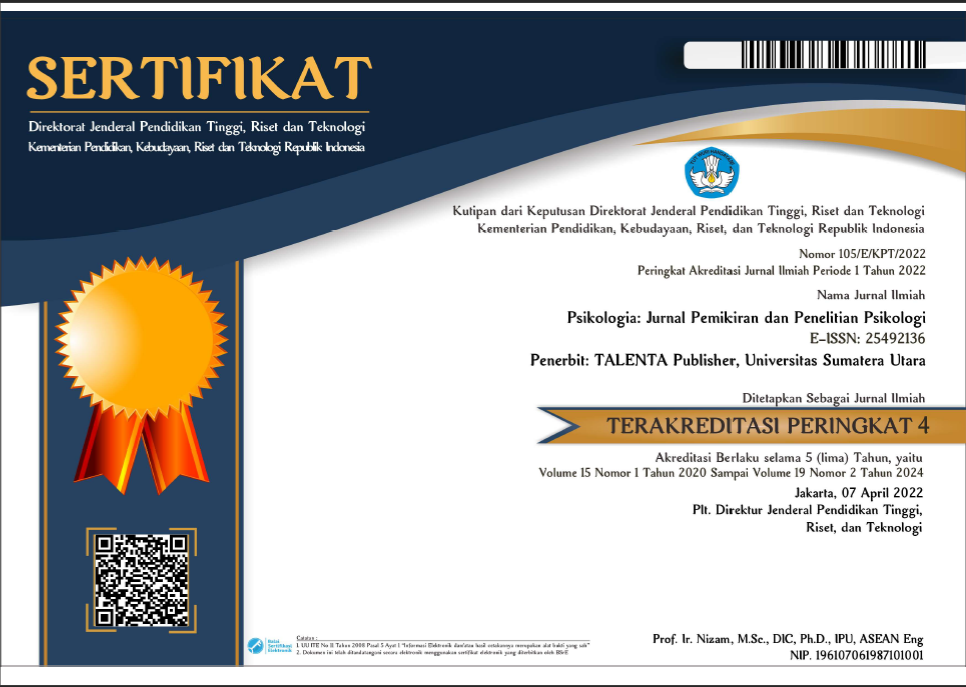The relationship of work-family conflict and quality of work life among female nurses in Medan
Hubungan work-family conflict dengan quality of work life pada perawat perempuan di kota Medan
DOI:
https://doi.org/10.32734/psikologia.v15i1.4385Keywords:
work-family conflict, quality of work life, nurse, perawatAbstract
This study examines the relationship between work-family conflict and the quality of work life among nurses in the city of Medan. The author hypothesized that higher level of work-family conflict would be associated with lower quality of work life. Participants were 105 female nurses from the city of Medan. We obtained the data using a questionnaire that measures work-family conflict and quality of work life. We analyzed the data using SPSS 17. The results showed a negative relationship between work-family conflict and quality of work life. Female nurses with higher work-family conflicts tended to have lower quality of work-life than those with lower work-family conflicts.
Studi ini meneliti hubungan antara work-family conflict dengan quality of work life. Dihipotesiskan bahwa peningkatan work-family conflict akan diikuti dengan penurunan quality of work life. Partisipan penelitian adalah 105 perawat berjenis kelamin perempuan di kota Medan. Data diperoleh melalui kuesioner yang mengukur work-family conflict dan quality of work life. Data dianalisis menggunakan SPSS 17. Hasil penelitian menunjukkan hubungan negatif antara work-family conflict dengan quality of work life. Perawat dengan work-family conflict yang tinggi cenderung memiliki quality of work life yang rendah.
Downloads
References
Field, A. (2009). Discovering statistics using SPSS. Singapore: Sage.
Greenhaus, J. H., dan Beutell, N. J. (1985). Sources of conflict between work and family roles. Academy of Management Review, 10, 76–88. https://doi.org/10.5465/amr.1985.4277352
Kelly, E. L., Moen, P., dan Tranby, E. (2011). Changing workplaces to reduce work-family conflict: Schedule control in a white-collar organization. American Sociological Review, 76, 265–290. https://doi.org/10.1177/0003122411400056
Korunka, C., dan Hoonakker, P. (2014). The impact of ICT on quality of working life (C. Korunka dan P. Hoonakker, Eds.). https://doi.org/10.1007/978-94-017-8854-0
Owolabi, A. B. (2015). Effect of work-family conflict and job satisfaction on quality of work life. Advances in Social Sciences Research Journal, 2, 51–59. https://doi.org/10.14738/assrj.22.83811
Ployhart, R. E., dan Vandenberg, R. J. (2010). Longitudinal research: The theory, design, and analysis of change. Journal of Management, 36, 94–120. https://doi.org/10.1177/0149206309352110
Presiden Republik Indonesia. (1992). Undang Undang Republik Indonesia Nomor 23 Tahun 1992 Tentang Kesehatan. Jakarta: Lembaran Negara Republik Indonesia Nomor 100.
Presiden Republik Indonesia. (2009). Undang Undang Republik Indonesia Nomor 44 Tahun 2009 Tentang Rumah Sakit. Jakarta: Lembaran Negara Republik Indonesia Tahun 2009 Nomor 153.
Presiden Republik Indonesia. (2014). Undang Undang Republik Indonesia Nomor 38 Tahun 2014. Jakarta: Lembaran Negara Republik Indonesia Tahun 2014 Nomor 307.
Tasdemir Afsar, S., dan Burcu, E. (2014). The adaptation and validation of quality of work life scale to Turkish culture. Applied Research in Quality of Life, 9, 897–910. https://doi.org/10.1007/s11482-013-9276-0
Utaminingsih, A. (2017). Gender dan wanita karir. Malang: Universitas Brawijaya Press
Downloads
Published
How to Cite
Issue
Section
License
Copyright (c) 2020 Psikologia: Jurnal Pemikiran dan Penelitian Psikologi

This work is licensed under a Creative Commons Attribution-ShareAlike 4.0 International License.








